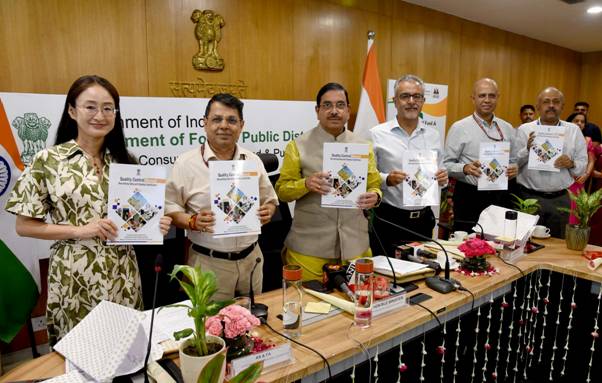New Delhi: The Union Minister of Consumer Affairs, Food and Public Distribution and New and Renewable Energy, Pralhad Venkatesh Joshi, today launched a series of initiatives aimed at enhancing India’s food security system. Among the highlights was the pilot project to transform 60 Fair Price Shops (FPS) into Jan Poshan Kendras across Gujarat, Rajasthan, Telangana, and Uttar Pradesh. Additionally, the Minister introduced the FPS Sahay application, Mera Ration App 2.0, Quality Management System, and several other key programs.
Speaking at the event, Joshi emphasized that these initiatives would strengthen the food distribution ecosystem by promoting transparency, improving quality control, addressing malnutrition, and curbing system leakages.
Jan Poshan Kendras: A New Opportunity for FPS Dealers
The pilot transformation of Fair Price Shops into Jan Poshan Kendras aims to provide FPS dealers with additional income streams while offering consumers access to a wider range of nutrition-rich food products. Under this program, 50% of the products sold at these Kendras will focus on nutrition, while the remaining inventory will consist of essential household items.
Addressing the long-standing demand of FPS dealers to enhance their earnings, Shri Joshi noted that the Jan Poshan Kendra initiative aligns with the Central Government’s first 100-day program and contributes to India’s broader goal of “Viksit Bharat 2047.”
Strengthening Food Security through Technology and Digitalization
The Minister also highlighted the government’s efforts to enhance food security by embracing digital solutions. The launch of Mera Ration App 2.0 brings more value-added features to beneficiaries nationwide, facilitating seamless transactions under the One Nation One Ration Card scheme.
In partnership with SIDBI, the FPS-Sahay application offers a collateral-free, paperless financing option to FPS dealers. This Invoice-Based Financing (IBF) system is expected to improve cash flow management for dealers, boosting their financial viability.
Quality Management System for Better Oversight
Joshi also unveiled the Quality Management System (QMS), a digital tool designed to integrate Quality Control labs within the Department of Food and Public Distribution (DFPD) and the Food Corporation of India (FCI). This system enables real-time tracking of transactions at various stages of procurement, storage, and distribution, ensuring strict quality standards for central pool
food grains. Alongside the QMS, a comprehensive Quality Control Handbook was introduced, outlining procedures, standards, and policies to be adopted by the central food security network to maintain quality benchmarks across the nation.
Enhanced Contract Transparency and International Standard Testing
The Minister also inaugurated the Contract Manual of the Food Corporation of India (FCI), designed to remove ambiguities in contract dealings, ensure competitiveness, and enhance transparency in tenders. This initiative aims to maximize participation and streamline the tender process across FCI operations, thereby improving the efficiency of India’s public distribution system (PDS).
In a move to align with global standards, three laboratories under the Department have achieved NABL (National Accreditation Board for Testing and Calibration Laboratories) accreditation. These labs are now fully compliant with international testing and calibration standards, ensuring the quality and reliability of food grains in the central pool. This accreditation will enhance customer confidence in the PDS system and ensure stricter quality control measures.
Catalyst for ‘Viksit Bharat 2047’ Vision
Pralhad Joshi remarked that these transformative steps, guided by the vision of Prime Minister Narendra Modi, are crucial for propelling India towards its goal of Viksit Bharat 2047. He highlighted the extension of the Pradhan Mantri Garib Kalyan Anna Yojana (PMGKAY) for another five years with a financial outlay of ₹12 lakh crore, ensuring continued food security for the vulnerable sections of society.





